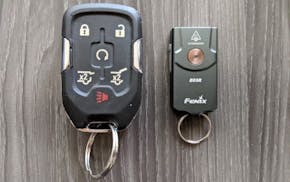Q: Code P0172 came up in my 2010 Chevy Malibu. The dealer charged me $100 to troubleshoot the code. I was told that all the sensors were good and to run the gas tank low and fill up with high-octane gas. Does going to high-octane gas make any sense to you? The "Check engine" light is still on and I'm concerned that if another code comes up I'll never know. What do you think?
A: If the engine in your vehicle is the 2.4-liter inline four-cylinder, the P0172 indicates a rich fuel/air mixture. The long-term fuel trim is beyond the range of adjustment based on the oxygen sensor feedback to the PCM. Look for a leaking fuel pressure regulator or fuel injector, or a restriction in the induction system like a clogged air cleaner or collapsed induction hose. Other possibilities include fuel contamination in the crankcase, a faulty PCV or evaporative emissions system, or contaminated fuel. If it is a fuel issue such as an excess amount of alcohol, the dealer's advice might help.
All bets are off if it's a V-6 engine because the P0172 code would indicate a rich mixture on cylinder bank 1 only. If this is the case, look for a mechanical issue with an injector or fuel pressure regulator.
By the way, you may be able to avoid the diagnostic charge in the future. A number of auto parts stores will plug a scanner into the diagnostic link on your vehicle and read any stored fault codes — at no charge. Taking advantage of this service not only can save you money, but arm you with accurate diagnostic information when you take the vehicle to the dealership or service agency.
Q: I am having a problem with my 2000 Chrysler minivan that I bought new. It had 175K on it the first time it stalled on me. Since no one could figure it out I just let it go until now. The problem is after driving the car for at least 40 minutes in very hot weather with the A/C on, the car starts to lose power as if it is running out of gas. The accelerator doesn't respond and as I put my foot on it, the car sputters worse and worse and eventually dies. When I try to restart it and it starts it runs really rough and eventually dies. The first few times I had it towed, and of course by the time it got there [service agency], it fired right up. There were no error codes and no one could figure out what was wrong. I learned that if I just let the car cool down for about 45 minutes it would start and run fine for a long period.
A: In the rest of your letter you mentioned having the crankshaft and camshaft position sensors replaced, but I doubt this fixed the issue. From your description, the engine is suffering from a loss of fuel pressure. If it is heat-related — high underhood temperatures — it would be labeled "vapor lock," where the fuel boils in the fuel rail, generating air bubbles that disrupt fuel delivery. Try carrying a spray bottle of water with you, and when this happens again open the hood and cool the underhood components of the fuel system with water. If the car restarts and runs cleanly, it's vapor lock. Servicing the cooling system and ensuring good airflow through the A/C condenser and radiator can help lower underhood temperatures.
If the water doesn't help, it's possible that it's a failing fuel pump or that debris in the fuel tank is slowly clogging the fuel strainer surrounding the fuel pickup as you drive. This would also cause a loss of fuel pressure, but after sitting the debris can fall away from the strainer, allowing the car to run fine again — for a while.



